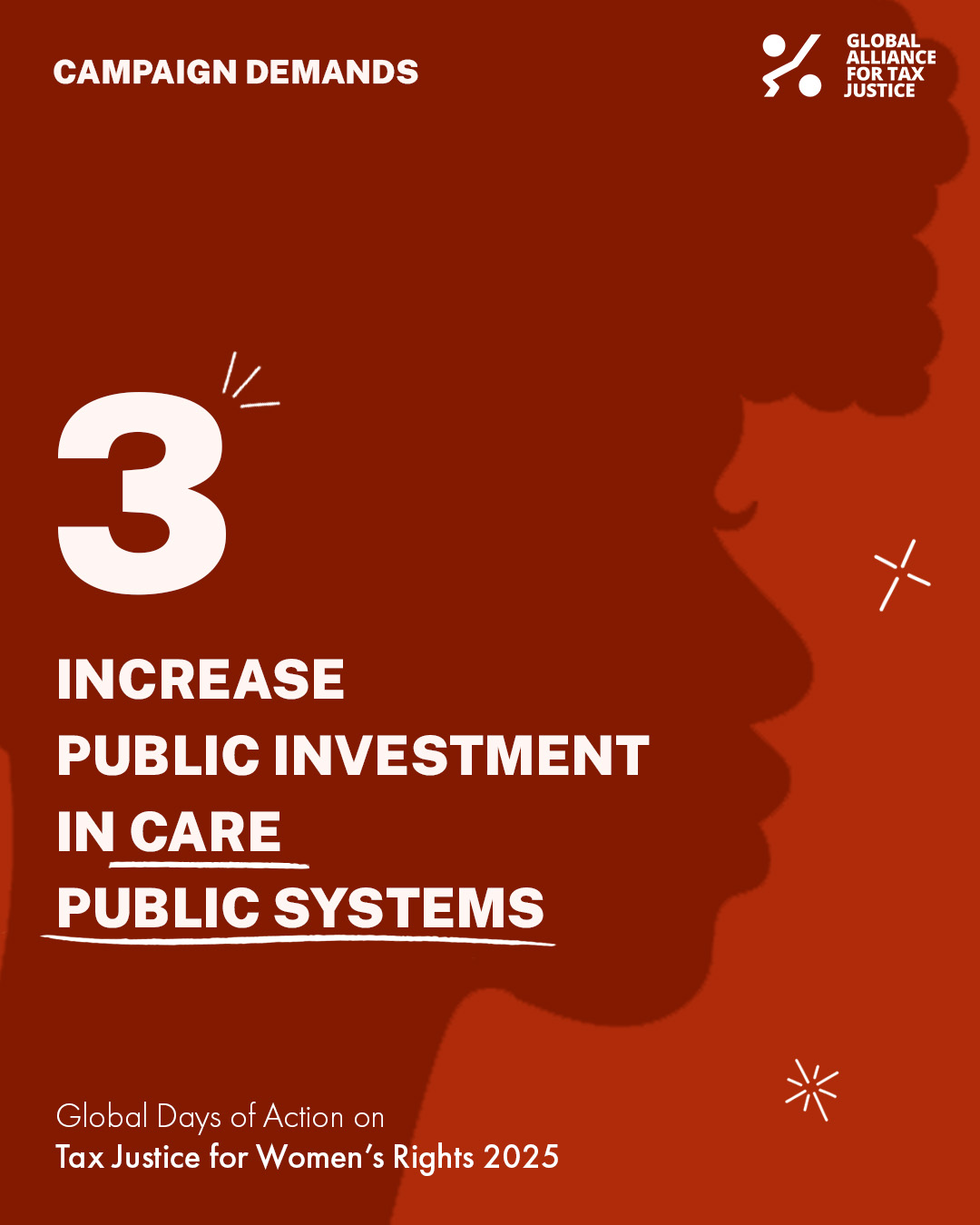This blog is the third in a series exploring the five demands of the 2025 Global Days of Action on Tax Justice for Women’s Rights.
By: Hazel Birungi, Programme Officer at International Women’s Rights Action Watch Asia Pacific (IWRAW AP) co-coordinating the Transforming Economics and Development through a Feminist Approach (TrEAD) programme
Between her cleaning job, hungry family, children to take to school and now Nana’s escalating medical needs, the hours blurred. Zelda’s hands ached, not because of the usual long shifts but from the weight of worry, sleep was a luxury.
“Come back next week” the clinic had said, their voices weary but that may be too late. Juggling her temporary domestic work, siblings, and Nana’s failing health Zelda was drowning. The system meant to help was broken, leaving her to watch her grandmother suffer and her siblings miss school. How many others, she wondered, shared this unbearable weight? How many others were sinking with her?
Zelda’s story, while fiction, is a stark reflection of a global crisis that is the burden of care, an unbearable weight borne disproportionately by women. Globally, women perform a staggering 76.2 % of the total amount of unpaid care work (16 billion hours per day), over 3.2 times more than men. This translates into16.4 billion hours of unpaid labour equivalent to 2 billion people working 8-hour days without pay. In a year, women dedicate 1,118 (47 days) hours to these tasks compared to men’s 572 hours (23 Days). Unpaid care work, the hidden engine of our economies, is valued at an astounding US $10.8 trillion more than the GDP of all but four countries.
Care work, whether bathing a baby, teaching a child, or nursing the elderly, is the invisible backbone of our world. Yet, it’s undervalued and ignored, relegated to the margins by patriarchal systems that equate care with a ‘female instinct’ and therefore rendered subordinate leading to it’s devaluation and this has devastating consequences. Feminist economists have long argued that traditional economic models fail to recognize the crucial interdependence between market production and domestic reproduction. While GDP measures market activity, it ignores the substantial unpaid care work, primarily performed by women, that sustains the workforce. This work is essential but historically dismissed as altruistic and valueless due to its non-market nature.
During crises like the COVID-19 pandemic, the essential role of women, particularly women of colour, in care sectors like nursing, grocery, and personal care became glaringly apparent highlighting the interconnectedness of personal care practices and broader social structures.
The lack of public investment in care services creates significant barriers for women, especially those from poorer households, who cannot afford private care. This disparity exacerbates existing inequalities, demonstrating the urgent need for economic models and policies that acknowledge and value unpaid care work.
Investing in care infrastructure, social protection, and public services is not just a matter of gender equality; it’s a matter of economic sustainability, social well-being, and environmental justice. As climate change and global crises disproportionately impact women, we must acknowledge that caring for people and caring for the planet are inextricably linked. Only by redistributing the burden of care, from women to men, from households to the state, markets, and communities, can we build a future where no one is left to sink beneath the weight of an unbearable burden. This is the urgent call of Sustainable Development Goal 5.4, a call we can no longer afford to ignore.
Addressing the systemic undervaluation of care work requires a fundamental shift in how society organizes care, moving beyond mere financial support to a recognition of care as a human right and a public good. This necessitates a strong political commitment, linking progressive taxation with gender-transformative public spending. Transformative change for women demands policies that acknowledge, reduce, and redistribute unpaid care work, with government incentives playing a crucial role. Fiscal policy can serve as a powerful tool to address these inequalities.
Governments must implement comprehensive policy changes that address the systemic undervaluation of care work. This starts with designing progressive tax policies that generate sufficient revenue from those who can afford to pay, and then investing these funds in publicly provided, gender-equalizing services like childcare, healthcare, and social protection. Fairer resource generation and redistribution through progressive taxation are crucial for reducing gender disparities in caregiving responsibilities and ensuring access to essential public services. This approach fosters a more inclusive and just society.
Governments must prioritize investing in care public services, ensuring decent work for care workers through fair wages, representation, and improved working conditions. A multifaceted approach, including policy interventions that improve household access to quality care. This can involve expanding care services, implementing care leave legislation, establishing insurance schemes, and promoting flexible work practices.
The 5Rs Care and Unpaid Care work Framework: recognize, reduce, redistribute, reward, and represent, provides a foundation for valuing unpaid care work. Recognizing the economic impact of care work, particularly on women’s employment prospects, is crucial.
Effective implementation of these policies necessitates gender-responsive budgeting, gender-disaggregated data, interministerial collaboration, and intersectoral cooperation. Media campaigns are also vital for shifting societal mindsets and promoting the redistribution of unpaid care work.
We demand that governments significantly increase public investment in care public systems by improving public care infrastructures and services, decent work, including fair wages, working conditions, training and professionalisation for care workers, especially women, who make up the majority of the care workforce. Investment in the care sector should be recognized as essential for economic growth, social well-being, and gender equality.

